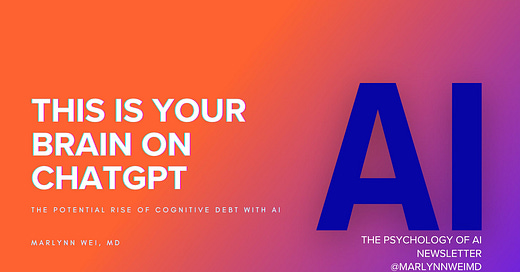How Overreliance On AI May Change Your Brain
New research sheds light on the cognitive debt that may come with AI reliance.
A new study by researchers at MIT Media Lab, Wellesley, and MassArt, titled “Your Brain on ChatGPT: Accumulation of Cognitive Debt when Using an AI Assistant for Essay Writing Task”, offers a revealing window into what may happen inside the brain when we rely on AI for cognitively demanding tasks like essay writing.
Using EEG, linguistic analysis, and post-task interviews, the researchers found that using ChatGPT weakened participants’ neural connectivity, memory, and sense of ownership over their writing. While AI make tasks feel easier, the lack of effort required may also be dulling the brain’s cognitive “muscles.”
Are we outsourcing not just tasks but also the very processes that help us grow, think critically, and learn?
New Brain Research on Cognitive Debt

Researchers divided 54 students and assessed them over four months:
ChatGPT / LLM group: Used ChatGPT exclusively for essay writing.
Search Engine group: Used traditional web searches like Google (no AI).
Brain-only group: Wrote essays using only their memory and reasoning.
Each group wrote essays based on SAT prompts. In an optional fourth surprise session, participants switched. Some LLM users had to write without AI, while some Brain-only participants were newly introduced to ChatGPT.

Here are key findings from the study:
Neural activity and connectivity was lower with AI use. The more AI assistance used, the less engaged key brain networks were—especially those involved in memory, attention, and executive function.
AI users retained less. Most ChatGPT users struggled to accurately quote from their own essays, unlike those who used only their brain or traditional search.
Sense of authorship dropped with AI use. AI users had a more mixed sense of authorship, with some participants feeling claiming full ownership and others denying it.
Satisfaction with their essays was mixed for the AI group and consistently higher for the search engine group.
The researchers coined this effect “cognitive debt," referencing how repeated reliance on AI systems may impair cognitive processes behind independent thinking. This cognitive debt illustrates that the short-term benefit of productivity and lower mental effort may lead to long-term costs of lower critical thinking, creativity, learning, and memory.

The Flattening Effect of AI
The essays themselves were more homogeneous within the AI group, while the brain-only group had more diverse approaches. The search engine group was heavily influenced by search engine-optimized content.
Interestingly, human teachers were able to detect patterns of AI-generated content and scored those lower in originality and structure, but AI judges gave higher scores to AI-generated essays.
Cognitive Challenge Builds Neuroplasticity
Cognitive effort is a pathway toward active growth and neuroplasticity. Much as in psychotherapy, the process of working through emotional conflict or grappling with complex thoughts fosters psychological integration and insight. Similarly, cognitive struggle in learning tasks strengthens neural pathways, boosts memory, and builds critical thinking.
When we bypass cognitive effort with AI, we may be undermining our own:
Cognitive resilience: Mental endurance is built by effort, not avoidance.
Metacognitive awareness: Thinking about thinking, which is essential to learning and self-awareness, declines when AI does the heavy lifting.
Memory encoding and consolidation: Memory is tied to attention, effort, and repetition. AI reliance may interrupt this process.
The solution is not necessarily to avoid using AI but finding a way to use it that minimizes this cognitive debt.
Clinical Takeaways for AI Users
💡 Be aware of passive learning. Letting AI write or think for you may feel efficient but undermines long-term comprehension and creativity.
🧠 Vary your modes of learning. Use AI as a starting point, but find ways of researching, examining, and integrating the material afterward. Revise, critique, or rewrite in your own words.
🔄 Check for cognitive “numbness.” If you no longer feel mentally challenged or curious after using AI, it might be time to pause and re-engage in other ways.
🧩 Balance ease with effort. Choose which tasks you automate carefully. Like training a muscle, cognition and neuroplasticity improve through healthy stress.
Mindful AI Collaborations
AI systems can be very helpful and effective, but this study highlights the potential impacts on the brain over time. Some tasks, like creative or cognitive ones, may be worth investing a little more energy and effort to develop, empower, and embrace our unique voice and perspective.
Marlynn Wei, MD, PLLC © Copyright 2025 All Rights Reserved.





